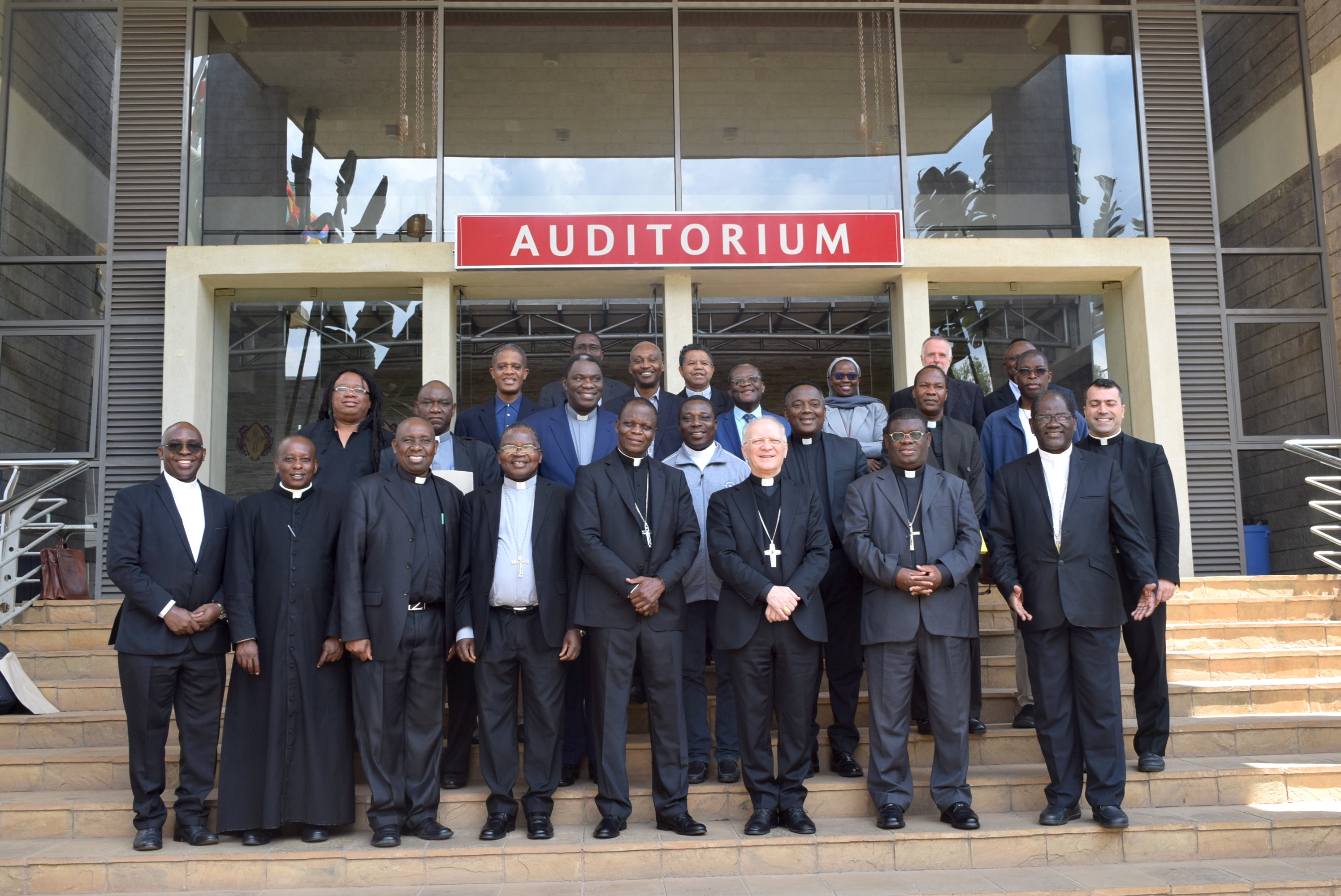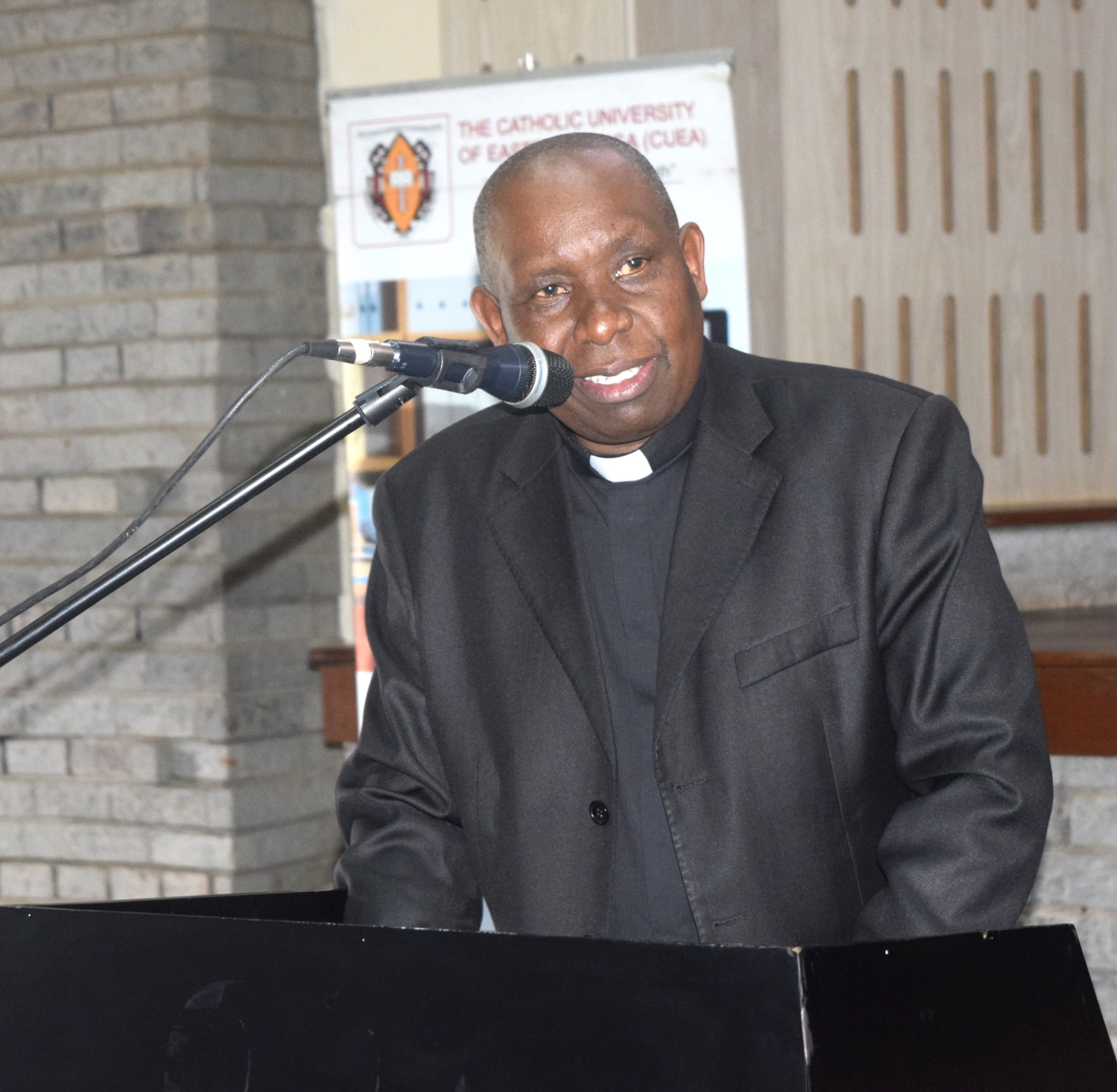KENYA: Archbishop Zani Presents Apostolic Constitution Veritatis Gaudium To Ecclesiastical Universities In Africa

A meeting of regional Chancellors, Rectors, Presidents and Deans of Ecclesiastical Universities and faculties has taken place at Catholic University of Eastern Africa (CUEA) in Nairobi from 29-30th November 2019, during which Secretary of the Congregation for Catholic Education at the Vatican Archbishop Angelo Vincenzo Zani presented the Apostolic Constitution Veritas Gaudium.
Addressing the congregation, Archbishop Angelo Zani explained that it is Pope Francis’ wish regarding ecclesiastical studies to ensure that they are realizing and promoting the studies while responding to the changes in the modern world. The Apostolic Constitution Veritas Gaudium, he said, is meant to guide all Catholic universities and faculties all over the world, more especially those offering Theology and Canon Law.
The convention on the African continent brought together the heads of regional ecclesiastical universities in Africa and Madagascar, which included the Catholic Universities of Congo and and Cameroun in the Francophone Africa and the Catholic University of Eastern Africa (CUEA) in the Anglophone regions of the Church on the continent.
His Excellency Archbishop Zani has stressed that ecclesiastical studies must respond to the changes which are going on in the world as he said, “Now in the world, the international community, the civil society, the economic powers are asking if the youth who are coming out from these universities are prepared to face the problems of the society and bring solutions to it.”
Archbishop Zani emphasized that education must prepare the learners to face the problems in society by stressing creativity, responsibility and problem solving. This challenge underscores the need for ecclesiastical universities and faculties to revise their statutes so that they are in line with the guidelines in Veritatis Gaudium.
Interviewed about the convention, CUEA Chairman for the University’s Council Rt. Rev. Maurice Muhatia who is the Ordinary of of Nakuru, Kenya, said that the coming of the Secretary of the Congregation for Catholic Education Archbishop Zani to Nairobi was very important for all Catholic Universities in Africa, adding that his visit is more more particularly important for the Catholic University of Eastern Africa at this point and time.
“The Veritas Gaudium is meant to guide us in the management and administration of CUEA as an ecclesiastical university which has a theological faculty and offers Canon Law, but I will be more concerned about how we are going to follow up with the requirements of this document, for example, revising our Statutes of the management of the University and our seminaries so that they are in line with Veritatis Gaudium.
On his part, Prof. Steven Mbugua, Vice Chancellor of CUEA has appreciated the Apostolic Constitution because it highlights, among other things, the need to revitalize the teaching of theology in the Faculty.

“It has also touched on dialogue between Theology or Religious disciplines and Social Sciences,” said Prof. Mbugua, adding, “It has also embraced the laity to be part of it because we cannot do it alone as clergy. It must be an agenda that embraces them as parents who are the first teachers of faith to their children.”
The occasion was also graced by the presence of the Apostolic Nuncio in Kenya and South Sudan His Excellency Most Rev. Bert van Megen and by the Chairman of the Association of the Member Episcopal Conferences of Eastern Africa Rt. Rev. Charles Kasonde who is also Chancellor of CUEA His Excellency and bishop of Solwezi Diocese in Zambia.
Key Highlights In Veritatis Gaudium
- The ‘joy of the truth’ is not an abstract idea but Jesus Christ himself who compels the Church to, “bear witness to and proclaim the Gospel in her mission unceasingly and with ever renewed vigour.”
- Ecclesiastical universities and faculties must respond to the need for a wise and courageous renewal of ecclesiastical studies.
- As universities for a missionary Church they must offer opportunities and processes for suitable formation of priests, Consecrated men and women and committed lay people in view of missionary.
- They must be bold in responding to the need for a cultural revolution as a worldwide network and in the light of Catholic tradition offer decisive contributions which provide answers to new situation and ideas.
- Highlighting the importance for people to rediscover God, the ecclesiastical universities and faculties must play their missionary role by presenting a spiritual, intellectual and existential introduction of the learners to the Gospel of Jesus Christ.
- They must promote authentic dialogue and a reciprocal exchange of the gifts that open up people’s hearts to God’s love between believers and non-believers.
- They must promote inter-disciplinary and cross-disciplinary approaches that are carried out with wisdom and creativity in the light of Divine Revelation.
- They must promote the spirit of networking between institutions by setting up channels of cooperation between the ecclesiastical institutions which are existing in the different countries, cultural contexts and religious traditions.
- They must revive ‘ecclesiastical studies’ which entails giving a new impulse to scientific research.
- They must do a theology that lives on the frontiers whereby the Catholic universities live up to their mission by taking up risks yet remaining faithful on the borderline.
By AMECCEA Online news


